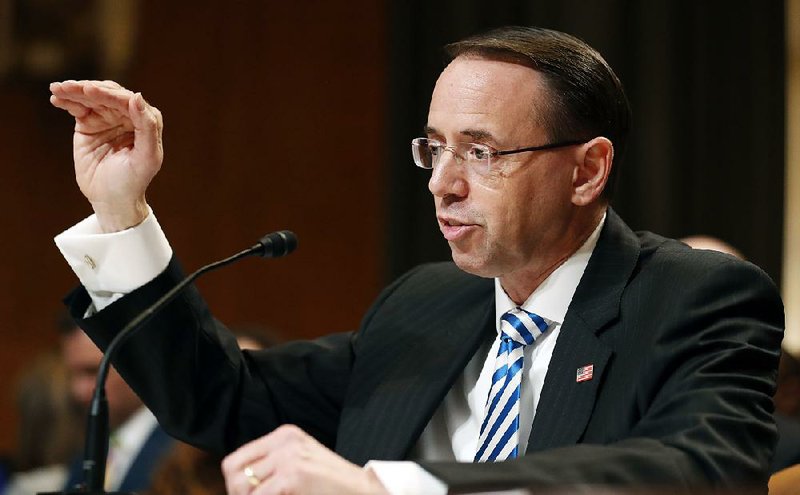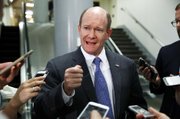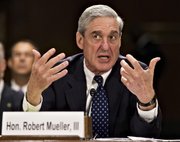WASHINGTON -- Deputy Attorney General Rod Rosenstein, addressing questions of whether President Donald Trump might fire Robert Mueller, the special counsel appointed to lead the investigation into Russia's election meddling, declared that he'd seen no basis for dismissing Mueller.
RELATED ARTICLES
http://www.arkansas…">Didn't collude, AG testifies
Responding to comments Monday from Christopher Ruddy, the chief executive of Newsmax Media and a friend of Trump, Rosenstein told the Senate Appropriations Committee that if the president ordered him to fire the special counsel handling the Russia investigation, he would comply only if the request were "lawful and appropriate."
Rosenstein, who has been on the job for six weeks, described Mueller as operating independently from the Justice Department in his investigation into whether the Trump campaign coordinated with Russia in the 2016 presidential election.
Asked what he would do if the president ordered him to fire Mueller, Rosenstein said, "I'm not going to follow any orders unless I believe those are lawful and appropriate orders." He added later: "As long as I'm in this position, he's not going to be fired without good cause," which he said he would have to put in writing.
[PRESIDENT TRUMP: Timeline, appointments, executive orders + guide to actions in first 100 days]
"If there were good cause, I would consider it," Rosenstein testified. "If there were not good cause, it wouldn't matter to me what anybody says."
House Speaker Paul Ryan, R-Wis., told reporters Tuesday that he had confidence in Mueller and called reports that Trump might fire Mueller "rumors."
"Let Robert Mueller do his job," Ryan said.
Lawmakers also asked Rosenstein whether it was appropriate for Attorney General Jeff Sessions to be involved in the firing of James Comey as FBI director given Sessions' recusal from any investigation into Trump's campaign. Rosenstein wrote a memo to Sessions on Comey, which was then used by the administration to justify firing the director for his handling of the Hillary Clinton email case last year.
Sen. Chris Coons, D-Del., asked Rosenstein: Why would the deputy attorney general have written a memo to Sessions that was "exclusively" about a matter from which Sessions was recused?
"I don't think that's a question for me to answer," Rosenstein responded. He later noted that it was up to Mueller to determine whether the issue might be part of his investigation, adding he thought Mueller "ought to review that."
Rosenstein was likely referring to the possibility that Mueller would investigate whether Sessions violated his recusal or whether Comey's firing was an effort to obstruct justice.
Lawmakers wanted Rosenstein to spell out the scope of Sessions' recusal, specifically with regard to the Russia investigation, which Sessions announced after reports emerged that he had not fully disclosed meetings with the Russian ambassador to the United States.
"I know what we're investigating, and he does not," Rosenstein said to Sen. Brian Schatz, D-Hawaii.
Mueller's probe
The discussion on Mueller's investigation came after some of Trump's closest allies -- including one of his sons -- began questioning whether the wide-ranging probe is becoming too political.
Those in the White House have expressed concern that the probe could detract from the president's agenda for months or years to come.
Until now, Mueller had drawn widespread praise from Republicans and Democrats alike. Trump hasn't commented on the former FBI director.
Even as leading Republican legislators Tuesday waved off the idea of firing Mueller, expressions of discontent with Mueller have bubbled up nonetheless.
Former House Speaker Newt Gingrich led one line of attack with a tweet that said "Republicans are delusional if they think the special counsel is going to be fair." He added that fundraising records show some of the lawyers whom Mueller selected for his team have contributed to Democrats.
"It makes sense to point out any level of bias, to highlight any biases inherent in Mueller and this probe in order to force him to be transparent," Gingrich said. He said Trump had called him Monday night and that the two discussed Gingrich's concerns about the probe.
On Tuesday morning, Trump supporter Ari Fleischer, who served as President George W. Bush's spokesman, again highlighted the issue of Mueller's probe being handled by attorneys who have donated mostly to Democrats, a message that Donald Trump Jr. quickly retweeted to his 1.7 million followers.
Peter Carr, a spokesman for Mueller, declined to comment on the issues Gingrich and others have raised. In general, it is impermissible to ask prospective government hires about their political leanings, including whether they've made donations.
Fleischer and Gingrich had previously vouched for the character and integrity of Mueller, who was appointed FBI director by Bush and whose term was extended an extra two years by Democratic President Barack Obama.
Anxiety about the probe -- and fresh concerns about the political leanings of some of the attorneys involved -- is percolating in the West Wing of the White House.
Ruddy, the CEO of Newsmax, raised the possibility of the president considering terminating Mueller. White House officials and a person close to Trump's personal attorney said Trump is not planning to make any moves on Mueller.
But Ruddy on Tuesday opened a new line of questions about Mueller's impartiality -- the fact that Trump had considered Mueller for the FBI director's job before he was named special counsel.
Mueller was interviewed by the Justice Department and by the president for the director's position, according to a senior White House official. The interview took place several days before Rosenstein picked Mueller as special counsel for the Russia probe, according to the official, who spoke on condition of anonymity to discuss the interview, which was first reported by PBS.
Other Trump supporters homed in on the sequence of Mueller's job interviews.
Sam Nunberg, who worked for Trump's presidential campaign, said it "could seem to be a conflict" for Mueller to first interview with the president to be a possible replacement for Comey and then days later to be named as the special counsel heading an investigation that could look into Comey's firing.
Trump has repeatedly denied colluding with Russia during the presidential campaign, and Comey and others have testified that there is no evidence to the contrary. Still, Gingrich said any special counsel with an agenda can "all of the sudden find something procedural and technical to latch onto."
Gingrich and Ruddy said it would be a "mistake" for Trump to remove Mueller, and both said they see the probe as unnecessary.
Information for this article was contributed by Sari Horwitz, Matt Zapotosky and Devlin Barrett of The Washington Post; and by Julie Bykowicz and Jill Colvin of The Associated Press.
A Section on 06/14/2017


